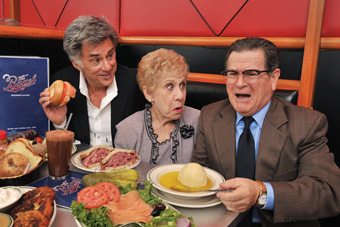You've Got to Be Joking
Permanent link All Posts
An older Jewish man is waiting for some test results at the doctor’s office. The doctor comes in and says, “I’m afraid I have some bad news and some really bad news.”
Alarmed, the old man says, “ok, tell me the really bad news first.”
“You have cancer,” says the doctor.
“Oy, that’s terrible,” says the old man. “What’s the bad news?”
“You also have Alzheimer’s.”
“Well,” the old man says, “at least I don’t have cancer!”
Yesterday, I saw the play "Old Jews Telling Jokes," which just made its Chicago premiere at the Royal George Theatre and runs through Feb. 16. In addition to a barrage of jokes (including the one above), there are a handful of monologues, and in one, a young man tells of a conversation with his father in which his father tells him that he has terminal cancer. The young man’s response is to tell a hospital joke, and the father jokes back, and two go back and forth telling jokes until they’re hysterical. The laughter follows them to a family dinner where the young man’s girlfriend chastises him, saying “some things you just don’t joke about.”
Whether it’s race, religion, gender, or tragedy – there are some things we’re told are off limits to humor. I understand the sentiment, but I’m not sure I agree. To make a joke at the expense of one of these touchy subject matters, you still have to follow the main rules of comedy – know your audience and know the context.
As I began typing an earlier portion of this blog post, a colleague – also Jewish – came into my office and asked about plans for sharing an image on social media commemorating the 75th Anniversary of Kristallnacht, or “night of the broken glass,”the biggest warning sign the Nazis would give of the impending Holocaust. He went on to tell me how earlier today he had to ask someone over the phone if they knew what Kristallnacht was. “The drug?” the person responded. I then assured him the image we should share about Kristallnacht would not be the logo from the show “Breaking Bad” (in which the main character cooks crystal meth) featuring the words “Breaking Glass.”
Perhaps to someone who watched in horror as Nazis destroyed Jewish shops and synagogues, making light of that horrible moment in Jewish history wouldn’t be acceptable. Maybe even to some without that connection. And though I was able to sweep aside the seriousness of the subject matter in favor of the perfect storm of clever wordplay, pop culture and the opportune moment, I also understood that seriousness. I knew my audience, I knew the context. Might someone have been offended? Probably.
Safe to say most Jews regard the Holocaust as off limits for humor. You won’t even find any Holocaust humor in “Old Jews Telling Jokes,” even though the show’s one artistic idea – the one thing it wants its audience to take away – is there’s always time for a joke. There’s no caveat in the little ditty they sing at the start and close of the show that includes lines about not listening to anyone who tells you otherwise. Do we, the Jews, known for our humor, have a double standard?
I learned about the Holocaust in every stage of public school and religious school. I’ve seen the movies and the plays and read the books. I’ve been to local, national and international museums; I’ve visited work camps and death camps. The only thing I don’t have is a personal connection to the tragedy. I’ve never once endured the hardship that year after year we celebrate having overcome, from Egyptian bondage to Auschwitz.
But if our ancestors, the ones who wandered in the desert for 40 years, could hear the millions of today’s kids who year after year sing “Pharaoh, Pharaoh, whoa baby, let my people go!” would they be outraged? Would the Jews of Shushan be okay with dozens of kids dressing up as Haman? Like those stories of tyranny and horror from long ago, will the Holocaust one day be treated with a sense of … humor?
I’ve always wondered why Jews are particularly adept with humor, from the Borscht Belt days and the Marx Brothers to Seinfeld, Sandler and Sandberg. How could we have endured this long if we couldn’t laugh about it? Our entire history is a story of overcoming adversity time and time again. You’ve got to have a sense of humor to endure that kind of repetitive persecution. We know too well how life can be too cruel, too unfair and too stressful, to take too seriously.
In the same monologue I mentioned earlier, the young man whose father has cancer explains that a year later, his father is dying and the son (with a new girlfriend) sits beside his death bed. “Are you comfortable?” he asks his father. “I make a decent living,” the father says.
The opposite of grief is not joy, but laughter. When we laugh, we let go. We are detached. We are present. The same is true when we make a joke, no matter the circumstances, no matter how hard it may seem to find the humor.



.jpg)



